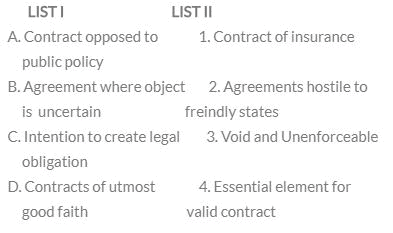Test: Other Essential Elements Of A Valid Contract- 1 - CA Foundation MCQ
30 Questions MCQ Test - Test: Other Essential Elements Of A Valid Contract- 1
A fraudulently informs B that his house is free from encumbrances. B thereupon, buys the house. The house is subject to a mortgage. What are the rights of B?
S, a seller of imitation jewellery, sells his business to B and promises, not to carry on business in imitation jewellery and real jewellery. The agreement is:
Match list I with list II and select the correct answer from the code given below the lists:

An agreement entered into with free consent & lawful but inadequate consideration is:
An agreement is void if it is opposed to public policy. Which of the following does not cover this head?
Which of the following statement is false ?
Parents or guardians shall _________ for breach of contract by minor:
In case, through the husband was a divorcee, he did not disclose the fact of his previous marriage to his wife and in-laws. It was held that the consent was obtained by:
A mortgage was executed in favour of a minor. Can the minor get a Decree for the enforcement of the mortgage?
A sum of money was agreed to be paid to the father in consideration of his giving her daughter in marriage. The agreement is void on ground’s of being:
The contract of “Uberrimae Fidei” means a contract:
X offers to sell a painting to Z which X knows is the copy of a well-known master piece. Z thinking that the painting is original decides to buy it at a very high price. Is this a valid contract?
Mistake as to foreign law is treated in the same manner as:
Which of the following agreements are expressly declared void by the Indian Contract Act?
A minor can do which of the following things?
A minor’s estate is liable for the _______ supplied to him:
Undue influence involves ___________pressure.
S instructs T to enter on his behalf into a wagering transaction. T loses in the transaction and pays from his pocket. He thereafter sues S for reimbursement. Can S raise plea of wager?
An agreement caused by mistake of Indian Law is :
If the illegal part of a contract is inseparable from legal part of the contract, the contract becomes :
Can a person who is usually of unsound mind, but occasionally of sound mind, make a contract?
When the consent is obtained by coercion, the contract is
Marriage brokerage contracts are:
When one party is in a position to dominate the will of another and uses his superior position to obtain the consent of weaker party, the contract is said to be obtained by
A contract caused by coercion is
The person providing necessary to minor is entitled to be reimbursed from miner’s property. This is because of which type of contract.
X is a patient in a lunatic asylum. At intervals of time he is of sound mind. He can enter into contract :
What is meaning of the term ‘Consensus-ad-idem?
Which of the following is not expressly declared void?
All agreement in restraint of trade are void does not apply to :



















